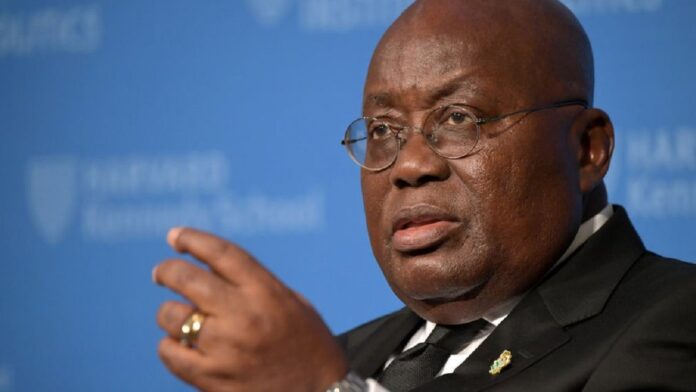Ghana’s Widening Tax Base to Reduce Fiscal Shortfall
Ghana’s widening tax base and stronger oil receipt will reduce her fiscal shortfall amidst uncertainties in the economy, according to macroeconomic report by Fitch Solutions. Due to the expected increase in government receipts, analysts at the firm said they expect Ghana’s fiscal deficit to narrow to 8.5% of gross domestic product (GDP) in 2022, from 9.3% in 2021.
“We have revised our 2021 deficit from 11.3% previously on the back of full-year data published by the Ministry of Finance, which shows higher-than-expected revenues of GHS70.1 billion, while total public expenditure rose to GHS109.3 billion”, it said.
Looking to 2022, Fitch Solutions analysts said they expect that measures to widen Ghana’s tax base and higher oil revenues will reduce the country’s fiscal shortfall, although spending will remain elevated given high interest expenditure and an inflated public wage bill.
At 8.5% of GDP, the fiscal deficit will remain larger than the 2010-2019 average of 4.9%. The report reads that revenue growth will remain above trend, but miss official targets. READ: Nigeria’s government runs fiscal deficits for 6-Year straight
“We forecast public revenue to expand by 27.0%, above the 10-year pre-pandemic average of 23.4%”. Improving consumer activity on account of looser Covid-19 restrictions will support value-added tax (VAT) receipts, which prior to the pandemic accounted for roughly 20.0% of tax revenue.
Analysts projected that household expenditure growth to accelerate to 4.0% in 2022, from 0.8% in 2021 while anticipating an increase in oil revenues due to rising global energy prices following Russia’s invasion of Ukraine.
Brent crude price is forecasted to increase by 40.9% over 2022 to an average of USD100.0 barrels per litre. The report said the recent implementation of the e-levy – a 1.5% tax on all electronic transactions – will further support revenue growth over the year.
However, analysts believe it will fall short of the GHS7.0 billion (6.9% of the total 2022 budget) projected by the government, for two reasons. First, it said the government had initially proposed a 1.75% tax on electronic financial transactions, but lowered it to 1.5% following pushback from the opposition.
Second, authorities had planned for the tax to come into force on January 1 2022. However, the e-levy only took effect on May 1, five months after the start of Ghana’s fiscal year. Furthermore, government revenues typically undershoot official targets in Ghana and were already 13.6% below the target in the first quarter of 2022.
As such, Fitch Solutions forecasted total revenues to reach GHS89.0 billion, below the official target of GHS100.5 billion. Despite some fiscal consolidation efforts, the firm noted that public expenditure will remain elevated, preventing a more substantial narrowing of the deficit.
In the 2022 budget, the government states that it will commit to ‘expenditure rationalisation and reforms’ in order to improve its fiscal position and maintain debt sustainability.
However, analysts expressed a view that due to the rigid nature of Ghana’s expenditures, there will be limited room to significantly restructure spending over the short term.
Ghana’s public wage bill and debt servicing costs accounted for 67.4% of total spending over Q1-2022. Accelerating consumer price inflation will raise the cost of living and likely prompt the government to raise public wages in order to limit risks of social discontent.
Analysts said headline inflation rate reached 23.6% in April 2022. Similarly, a weakening of the cedi and rising investor concerns over Ghana’s slow fiscal consolidation will push up borrowing costs over 2022. Taking these factors into account, Fitch Solutions analysts said they expect public expenditure to rise by 23.6% to GHS135.0bn in 2022.
Fiscal Shortfall to Narrow in 2023
The budget deficit will narrow further in 2022, albeit to a still-wide 7.5% of GDP. Accelerating economic growth – to a forecast of 4.8% in 2023, from 4.4% in 2022 – will increase tax collection.
In addition, the e-levy will be in place for the full year, further supporting revenue growth. Meanwhile, we see public expenditure fall to 23.8% of GDP, from 25.2% in 2022, in line with the government’s medium-term fiscal consolidation objectives.
Analysts expect that public borrowing will continue to rise to cover the still-large deficits in the coming quarters and forecast total public debt rising from 79.0% of GDP in 2021 to 83.0% in 2022, and 84.5% in 2023. Recalled that Ghana has effectively been cut off from international capital markets, which means the country will have to rely on domestic debt issuance over the short term.
The country’s domestic debt market is relatively shallow, according to analysts and banks are already highly exposed to government debt. As such, a rise in domestic debt issuance over the coming quarters could crowd out the private sector, weighing on growth.
“Against this backdrop, we believe that authorities will likely seek a new financial package from the IMF in Q422 or 2023 – despite the government having stated it will not do so – to finance its deficits at a lower cost and restore market confidence”, Fitch Solutions. #Ghana’s Widening Tax Base to Reduce Fiscal Shortfall












